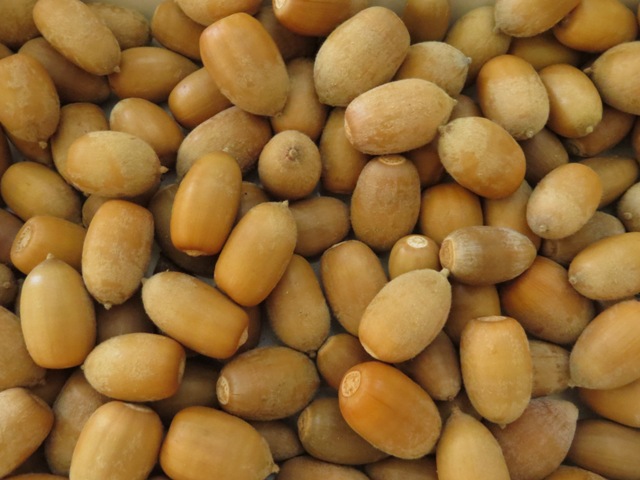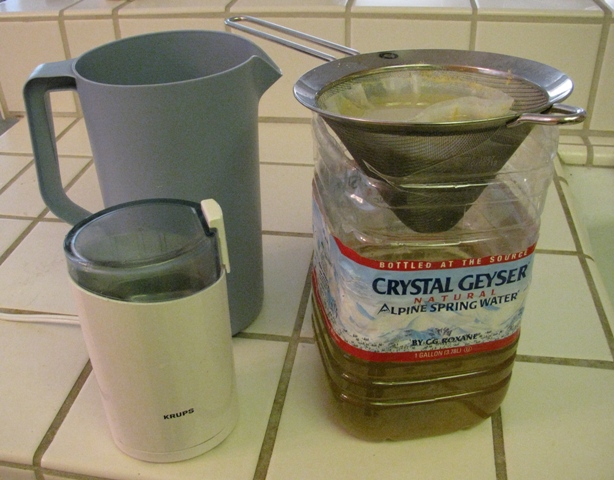Hi Everyone!
For me, the end of summer is signaled by the start of the acorn harvest. True Oaks (Quercus) and Tanoaks (Lithocarpus) in my area produce a wonderful crop of acorns. Nutritious food literally falls from the trees!
Many types of wildlife rely on this food, from black-tailed deer to acorn woodpeckers. And as many of you know, indigenous peoples around the world used acorns for food wherever they occur.
I also use acorns for food. Sometimes I prepare a more traditional mush, other times I use acorn meal to bake my favorite Orange-Acorn bread.
Many people locally express interest in processing acorns for food, so I thought forum members might be interested as well.

A Gentle Reminder:
In the past, I have been a little hesitant to post information online about acorn processing. I am concerned that too many people harvesting acorns will impact wildlife, much of which uses acorns for food. This is a real concern for metropolitan areas (where I live). A small fraction of the human population harvesting acorns could easily consume an entire crop. It is also becoming fashionable in my area to incorporate wild foods into restaurant menus. Modern humans no longer rely on acorns for survival. But the animal population still does.
So please be attentive to this so that you do not over-harvest where wildlife needs the food source the most. As bushcrafters, we are stewards of the land more so than others.
Equipment:
The equipment you need is very simple, and you probably have all of it already available in your kitchen:

You will need:
Not shown:
Links to Instructions:
I am consolidating all of my most recent information about processing acorns for food and toys and making it available online. It will probably take the better part of this month to do so. In case forum members are interested, I will place links to the information in this thread so everyone can find it, and add links as I get more of the information online.
How to Make Acorns Into Food (Part 1) - Covers indigenous use, nutrition, outlines steps to process, some information on selecting/harvesting, drying
How to Make Acorns Into Food (Part 2) - Covers equipment, shelling, tannins, and grinding. Touches upon traditional methods of leaching acorns.
How to Make Acorns Into Food (Part 3) - Covers leaching and cooking (both traditional and modern methods)
I hope people find this information helpful. I derive a great deal of pleasure from processing acorns into food. Hopefully other forum members will enjoy it as well.
If you already process acorns, can you share your tips/tricks/recipes with the rest of us?
- Woodsorrel
For me, the end of summer is signaled by the start of the acorn harvest. True Oaks (Quercus) and Tanoaks (Lithocarpus) in my area produce a wonderful crop of acorns. Nutritious food literally falls from the trees!
Many types of wildlife rely on this food, from black-tailed deer to acorn woodpeckers. And as many of you know, indigenous peoples around the world used acorns for food wherever they occur.
I also use acorns for food. Sometimes I prepare a more traditional mush, other times I use acorn meal to bake my favorite Orange-Acorn bread.
Many people locally express interest in processing acorns for food, so I thought forum members might be interested as well.

A Gentle Reminder:
In the past, I have been a little hesitant to post information online about acorn processing. I am concerned that too many people harvesting acorns will impact wildlife, much of which uses acorns for food. This is a real concern for metropolitan areas (where I live). A small fraction of the human population harvesting acorns could easily consume an entire crop. It is also becoming fashionable in my area to incorporate wild foods into restaurant menus. Modern humans no longer rely on acorns for survival. But the animal population still does.
So please be attentive to this so that you do not over-harvest where wildlife needs the food source the most. As bushcrafters, we are stewards of the land more so than others.
Equipment:
The equipment you need is very simple, and you probably have all of it already available in your kitchen:

You will need:
- Pitcher (to hold water)
- Coffee or seed grinder (easy to clean blender can substitute)
- 1 gallon plastic water jug
- Small strainer/colander (one shown is conical, I have since switched to semi-circular)
- Coffee filters that fit the strainer you have selected
Not shown:
- Rubber mallet
- dish towel
Links to Instructions:
I am consolidating all of my most recent information about processing acorns for food and toys and making it available online. It will probably take the better part of this month to do so. In case forum members are interested, I will place links to the information in this thread so everyone can find it, and add links as I get more of the information online.
How to Make Acorns Into Food (Part 1) - Covers indigenous use, nutrition, outlines steps to process, some information on selecting/harvesting, drying
How to Make Acorns Into Food (Part 2) - Covers equipment, shelling, tannins, and grinding. Touches upon traditional methods of leaching acorns.
How to Make Acorns Into Food (Part 3) - Covers leaching and cooking (both traditional and modern methods)
I hope people find this information helpful. I derive a great deal of pleasure from processing acorns into food. Hopefully other forum members will enjoy it as well.
If you already process acorns, can you share your tips/tricks/recipes with the rest of us?
- Woodsorrel
Last edited:
